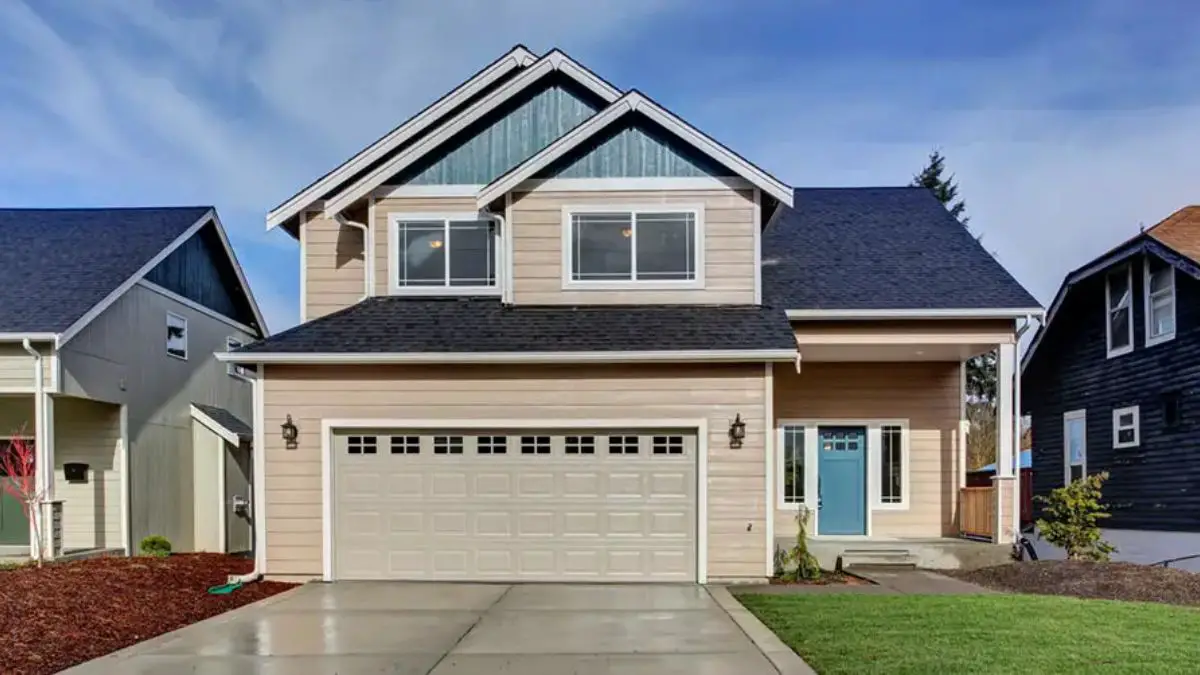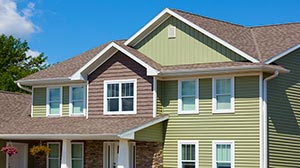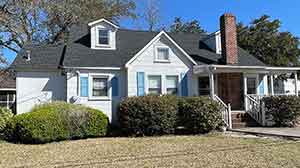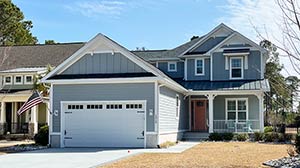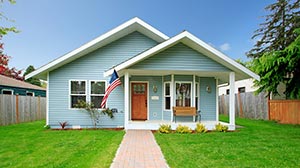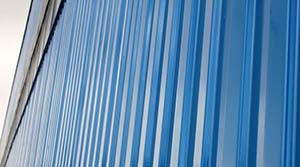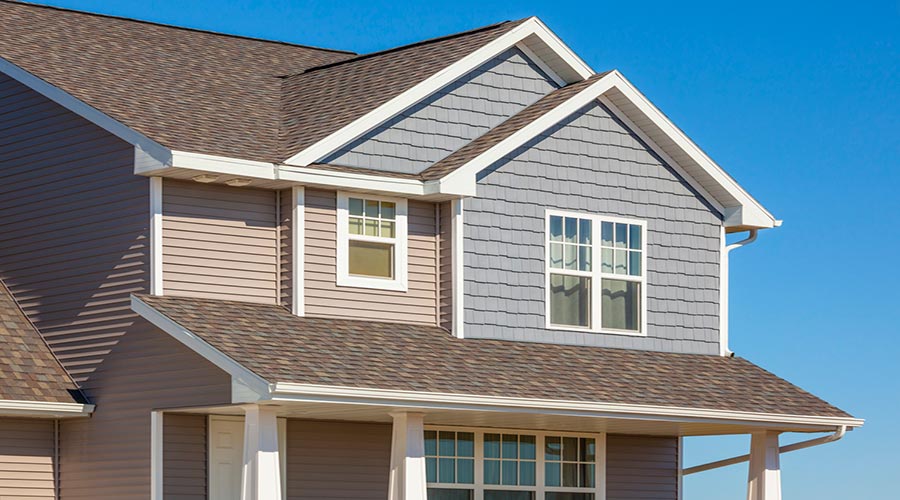
There are loads of siding options that you can choose for your house. However, the use of any of them raises the concerns of whether they increase the house’s value or not. Among the most controversial siding materials is vinyl. Some people consider it as cheap and degrading to the house’s appearance. But is this truly the case? Does vinyl siding appear cheap or lessen the house’s value?
Vinyl is inexpensive compared to other siding products. However, being affordable doesn’t necessarily mean your house will look cheap. The price for purchasing vinyl sidings and the amount you spend to maintain it are all very inexpensive. Factors that affect how vinyl siding looks on your house include:
- The quality of the vinyl siding matters. The low-grade vinyl siding is thin and can ripple or damage easily. Higher grade vinyl siding has a thicker profile, is more durable, comes in a wider variety of colors, and low-gloss finishes that can look great and last a long time.
- The quality of the installation is the utmost importance. No matter which grade vinyl siding you choose, if the installer is inexperienced or takes short-cuts the siding will look cheap. You should remove existing siding and install a smooth outer sheathing with a weather resistant barrier to ensure a clean installation.
You’ve been eyeing that new vinyl siding for your home or commercial building. You know it’s the hot trend in exterior renovations, but you’re not sure if it will look cheap on your house. If this is your concern, then you should read this blog post.
Here are 10 things you should consider before installing vinyl siding on your home.
1. Vinyl Siding is Weather Resistant
Many homeowners choose vinyl siding instead of wooden or aluminum siding because it is weather resistant. If the homeowner lives in an area with high amounts of precipitation, then this could be a huge advantage.
Not only will it help deter water damage to the exterior of the house, but if installed correctly, it should also allow airflow between the inside and outside of the house. It can help keep the building cool in warmer months and warm during colder ones.
2. Vinyl Sidings Need Minimal Maintenance
Some materials require more maintenance than others to keep them looking nice. Wooden siding, for example, needs regular sanding and staining so that it does not warp or fade over time.
It is a costly process for homeowners as they often need to hire a professional service to refinish their siding every couple of years if they want it to look like it did when it was new.
Vinyl siding is far easier to maintain than any other type of siding and does not need to be sanded or repainted. Power wash it to get rid of dirt and grime, and you’re good to go.
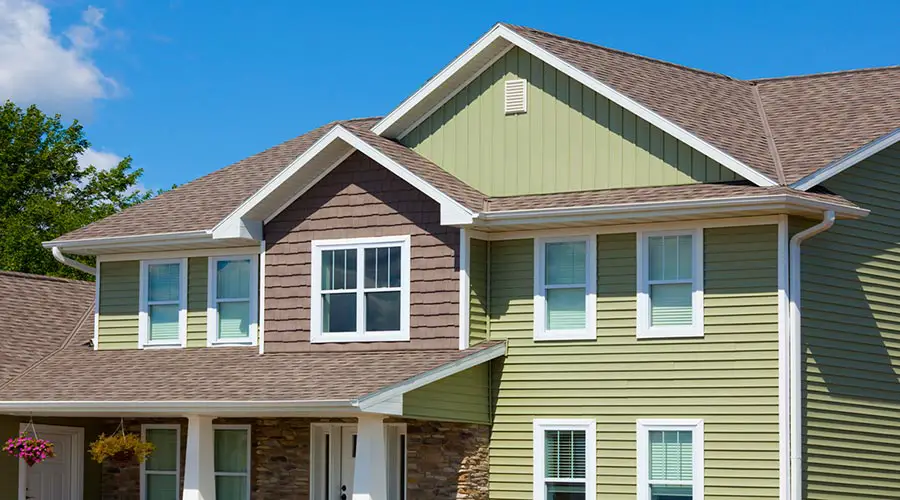
3. Vinyl Siding is Available in Variety of Colors
Vinyl siding has many different patterns and styles, which means there’s something for everyone. From brick-looking patterns to flat panels with no design at all, you can find the look you’re going for at an affordable price.
As we mentioned above, there are many options for vinyl siding styles and patterns. But what about color?
When choosing a type of siding, homeowners must choose from light or dark shades of browns, greys, or whites. With vinyl siding, however, homeowners have more variety. They can choose between different colors like redwood, green, black, and even blue if they want something unique.
4. Vinyl Sidings are Inexpensive
Vinyl siding is one of the least expensive exterior upgrades homeowners can make to their house. The initial investment may seem high at first, but it’s more affordable in the long run because you won’t have to worry about labor costs or upkeep.
Vinyl is inexpensive to maintain.If you’re concerned about how much it’s going to cost to paint the exterior of your home, then vinyl siding is one of the most affordable options out there.
You don’t have to pay high prices for services like repainting or staining, so this is a plus when you consider whether or not vinyl siding will work for your needs.
A well-maintained vinyl siding can last 20 to 40 years or more, depending on the material quality. Low-grade materials can fade, reducing the curb appeal over time. Many higher-grade vinyl products resist fading much longer than low-grade products.
5. Vinyl Siding Can be a Great Investment
One of the best things about vinyl siding is increasing property value. It means that if you ever go to sell your home, not only will buyers be impressed with how good it looks on the outside, but they’ll also love how much money they’ll save by not having to make any repairs or replace the siding for a few years.
Vinyl siding can last for years before requiring any repairs since wood is no longer exposed to the elements, which means there shouldn’t be any rotting, termites, or mold issues whatsoever.
Whether vinyl siding is a great investment or not depends mainly on the quality of the installation. When choosing a contractor, ask questions about their installation process and their crew member’s experience working with vinyl siding. Ask for references if possible.
6. It Will Reduce Noise Pollution
Vinyl siding helps muffle sound, which can drastically reduce noise pollution inside your house. If your windows face a busy street or your home is close to an airport, using vinyl siding is a great way to reduce sound pollution and enhance your quality of life.
7. Vinyl Sidings are Eco-Friendly
Vinyl siding is so eco-friendly that it can help you earn environmentally sustainable credits. Not only does it protect your house against insects and pests, but the ultraviolet rays from the sun won’t be able to reach your home thanks to its protective layer either.
You can even choose between different vinyl types made with recycled materials for an even greener approach.
8. Vinyl Siding Prevents Insects from Entering Your Home
Insects like ants love entering homes through cracked or damaged areas where wood meets stone or brick on the exterior of a building.
A good quality weather-resistant barrier behind the vinyl siding can also serve as a barrier against insects. Ensure the contractor seals all wall penetrations with silicone.
9. It Can Increase Curb Appeal
Many people choose to renovate their homes because they want buyers to like them more (and therefore pay more money). When it comes time for potential buyers to take notice of your house, they’ll notice the new exterior first.
Vinyl siding makes gardens pop and other features on your home stand out, so there’s a higher chance of getting you more money for your home sale.
Vinyl siding does not devalue a home. Many people who choose to install vinyl siding also decide to update their entire exterior. It usually includes updating the doors and windows of their home or even changing out those details on their front porch. As long as you make sure it’s a style that will mesh with the rest of your house, this can be an excellent thing.
10. Vinyl Siding Eliminates the Need for Painting
Do you hate painting? If it sounds like something that would stress you out, you are one of many homeowners who should consider having vinyl siding installed on their homes right away.
Although if you want to, vinyl can be painted like any other material. We recommend that you get more than one coat of paint on your sheets because this will ensure that it lasts for many years and the color is just what you’re looking for.
If you’re looking for a different style, consider changing your exterior design and painting. This also helps you with maintenance when repainting sections of your home.
Be sure to discuss this option with someone who installs vinyl siding because it can save homeowners hundreds or even thousands of dollars during the lifetime of their homes.
What are the Disadvantages of Vinyl Siding?
While vinyl siding will bring certain benefits to your home, there are some minor disadvantages that you should be aware of.
Vinyl Should Only be Installed by a Professional
You can’t install vinyl siding on your own because it requires a lot of measuring and precision when cutting the sheets. If you try installing it yourself, then chances are something won’t line up correctly, which could lead to even more costs in the future involving repairs by a professional.
Instead, you should seriously consider hiring an installation service to ensure that you get the best possible outcome.
Vinyl Siding is not Suitable for Extreme Climates
Vinyl siding will not work in areas with excessively hot or cold temperatures because it can change color and become loose during extreme weather conditions. Other types of siding materials can withstand both extreme hot and cold climates.
For this reason, make sure you pick one that’s best suited for your needs before making a final decision.
Vinyl Siding can Stink After Installation
Many people who have just had vinyl siding installed on their homes quickly complain about how bad it smells afterward.
They may even notice a strange taste in the air because the chemicals used are so strong, which means you should wait until all fumes have dissipated before bringing any pets inside.
Vinyl Siding may be Expensive to Replace Damaged Panels
If your home sustains damage, then it’ll be up to you to pay for new panels or replace broken ones yourself if you want them replaced at all. It is different from wood which can be painted or stained to hide damage over time.
Vinyl siding colors can be almost impossible to color match if the siding has any age. Many manufacturers change their color palettes every few years to offer customers more options. It’s a good idea to purchase an extra box of siding to keep for replacing damaged panels.
If you’re worried about the cost of replacing damaged sheets, then be sure to get a warranty before getting the vinyl siding installed on your home.
Is Vinyl Siding Easy to Clean?
Vinyl siding is easy to clean. It’s usually easier to clean than wood, thanks to the smooth surface of every sheet.
If you’re worried about mildew and mold, then you’ll be glad to find out that this material resists both substances well, which is why we recommend it for people who live in humid areas or tend to sweat a lot during certain seasons. Vinyl siding usually resists mold pretty well, so there shouldn’t be any discoloration issues that would reduce the quality of this material over time.
It also prevents dirt from sticking to the surface, making your home look very dirty if you don’t take care of it immediately after a storm or heavy rain. Remember that it’s essential to clean off mildew and other substances within 24 hours if you want to keep your siding looking great for years. If not, the dirt will eventually stick to the top layer and reduce its overall shine.
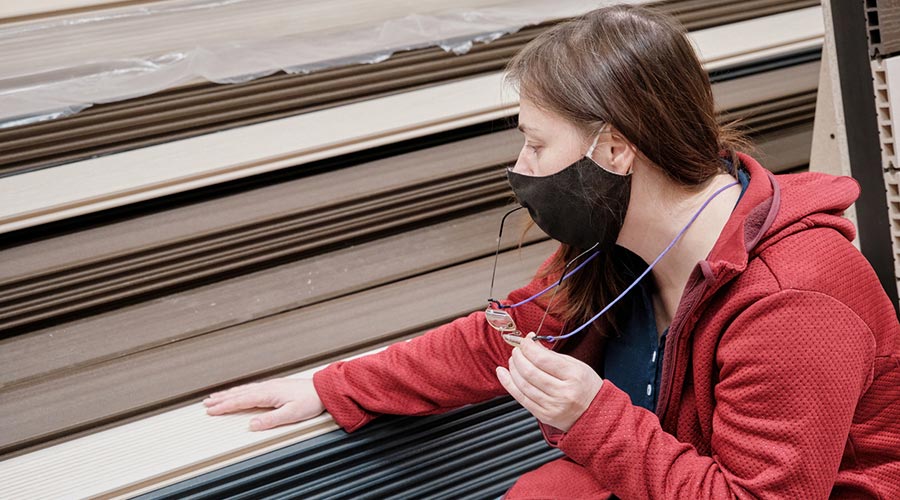
Different Types of Vinyl Siding
Most people think about one specific material when they picture vinyl sidings since it’s usually what they use in their homes, but there are 3 main alternatives that you may want to consider:
- Thermoplastic Polyvinyl Chloride (PVC)
It is the cheapest type on the market, and while it’s less durable than other options, it does a pretty good job at protecting the home from moderate damages. It’s also easier to install, making it a common choice for DIYers.
- Vinyl Brickmould
It is an inexpensive material that does its job well in most conditions (even when exposed to extreme weather conditions). Just keep in mind that this material is meant explicitly for brick homes with cedar siding installed on top of them.
- Textured Polyvinyl Chloride (PVC)
The option doesn’t cost too much like thermoplastic PVC, but it offers better protection than regular PVC sheets due to its textured surface (which prevents algae and fungus growth in high humidity areas). It’s also not easy to install, so make sure you ask for help if needed.
What Should I Consider Before Buying Vinyl Siding?
It would help if you considered several factors before purchasing new vinyl siding for your home or other commercial structure. To decide if vinyl siding is right for you and your needs, ask yourself these 10 questions:
- How long do I want this exterior renovation to last?
Vinyl siding will not last forever, but it can last up to 30 years or more with proper installation and maintenance by the homeowner.
However, keep in mind that many other types of exterior renovations, such as concrete overlays or stone veneers, may cost only 25% less than what you would spend on vinyl siding but last 5 times longer.
- What are my siding maintenance needs?
Vinyl siding requires little maintenance. However, it is essential to clean off dirt or debris after strong winds. Heavy rains may also cause some areas of the home’s exterior to become slick, so make sure you have a way to climb up your ladder safely when cleaning your vinyl siding.
- Do I need an energy-efficient exterior renovation?
If reducing your energy costs is crucial to you, consider upgrading to more expensive energy-saving options that can help lower heating and cooling bills in the long term – such as stone veneers or brick cladding.
- Is my neighborhood picky about exterior renovations?
Some neighborhoods might have rules about what types of exterior renovations are permitted, so you will want to check with your community before choosing any specific kind of siding material.
If you plan on selling your home soon, appearance is essential, and many buyers prefer houses with more modern renovations such as new vinyl siding.
- Will I need a warranty?
Factory-installed siding warranty can range from 10 years on architectural-grade material up to 50 years on certain vinyl siding products designed for heavy commercial use.
Vinyl siding installation warranties may last between 10 and 20 years, depending on the product chosen and who installs it.
While this does not cover general maintenance or repairs, it can help you save money if anything goes wrong with your new exterior renovation soon after installation.
- How much do I want to spend?
The price of vinyl siding can vary greatly depending on the chosen material, whether it is factory-installed or installed by a contractor, and what type of warranty is included in the purchase.
- Which colors should I consider?
Vinyl siding products are available in many different colors – even wood grain options for those who like the look without the upkeep required by natural wood.
Make sure you choose a color that matches your home’s exterior décor or allows you to repaint your home with one paint for both the siding and your house trim.
- What type of climate will my new exterior renovation be exposed to?
If your climate is harsh or prone to certain weather conditions, you may want to consider upgrading to a thicker vinyl siding product. For example, if you live in an area with lots of snowfall, icicles can build up under the eaves and weigh down vinyl siding, causing it to crack.
If this sounds like something that could happen in your neighborhood, consider opting for exterior renovations made from heavier materials such as stone veneers or aluminum/steel cladding.
- Which exterior renovation manufacturer should I choose?
Many different manufacturers of factory-applied exterior renovation products are available. Make sure you choose a manufacturer known for their vinyl siding so you can be assured your exterior renovation will last for years to come.
Conclusion
Vinyl siding is an affordable, easy-to-maintain exterior renovation that works well in many locations. It requires little maintenance and comes in various styles and colors that match most modern homes.
Make sure to consider your climate, needs for exterior renovations, and warranty options before choosing any specific type of material so you can get the best exterior renovation for your home and location.
By understanding vinyl siding pros and cons, you can better determine if this renovation option is suitable for your home.


